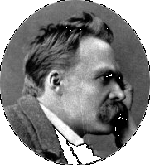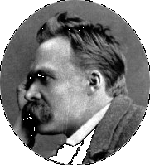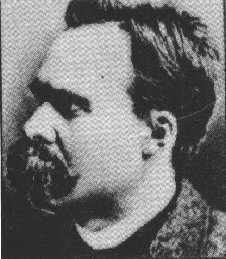

![]()

 |
|
 |
Friedrich Nietzsche was born in Röcken, Prussia, on 15 October 1855. This date was the same as the birthdate of Prussian king Frederick William IV. Friedrich's father Karl Ludwig Nietzsche was a tutor in the royal court and was quite pleased by the timing of his son's birth.
There was at all events one advantage in the choice of this day to my birth; my birthday throughout the whole of my childhood was a day of public rejoicing.
- from Ecce Homo
| Friedrich Nietzsche's life unquestionably trained him for his role as an "anti-Christian" philosopher. He descended from a long line of clergymen, including his father, giving him the theological background to challenge the familiar religious institutions. Biographers indicate there were at least 20 clergyman in the Nietzsche family within five generations. His paternal grandfather, Friedrich August Ludwig Nietzsche, was even granted an honorary doctorate in 1796 for his work Gamaliel, a defense of Christianity. It was assumed Friedrich would be a minister. As a child, Nietzsche was called the "little minister" by schoolmates. He spent much of his time alone, reading the Bible. Nietzsche's father died in 1849. The young man withdrew deeper into religion. Friedrich received a scholarship to Schulpforta, an elite prepatory school with only 200 students, in October 1858. The scholarship was intended to fund Nietzsche's training for the clergy. His mother, Franziska, and his young sister, Elisabeth, were dedicated to Friedrich's success, certain of his future. |  |
| At the age of 18,
Nietzsche lost his faith in traditional religion. His
faith received a fatal blow when he found philosophy. In
1865 Nietzsche discovered Schopenhauer's World
as Will and Idea. The work
forever changed Nietzsche's view of the world.
Schopenhauer's philosophy was rather dark for its time;
it became a part of Nietzsche's world-view as it was
well-suited to his nature. It seemed as if Schopenhauer were addressing me
personally. I felt his enthusiasm, and seemed to see him
before me. Every line cried aloud for renunciation,
denial, resignation. Nietzsche was conscripted into the military at the age of 23. While he had hoped to avoid the draft, he had no such luck. He was not destined to be in the military however, soon falling (or thrown) from a horse. Nietzsche's shoulder and chest were injured, possibly torn muscles, and he was released from service having not yet completed training. Curiously, Nietzsche continued to idealize the military and its orderly way of life despite not wanting to serve in the army. His respect for the individual gave way at times to a need for order. The University of Basle appointed Nietzsche to a chair when he was 25 years old. As a professor of classical philology, Nietzsche spent his days lecturing and analyzing Latin and Greek works. He later recalled this as a most unheroic contribution to mankind, wishing he had pursued a more active and socially valuable career, such as medicine. Nietzsche never was satisfied with his own value. In 1869, composer Richard Wagner invited Nietzsche to spend a winter holiday with him in Tribschen. Wagner was living with another man's wife and was not known for his conformity. Somehow, Wagner appealed to Nietzsche's sense of adventure. Nietzsche was so taken by Wagner that he decided his first book would be a tribute to Wagner's music. Unfortunately, the writing this work was delayed by war in 1870, when Germany and France went to war. Still romanticizing the life of soldiers, Nietzsche went to volunteer for military service. This time the army refused him due to his poor eyesight, in addition to his weak upper body. Nietzsche found it possible to serve as a medic, allowing him as close to medicine as his nature would ever allow. As he quickly learned, Nietzsche did not like the sight of blood, and the suffering of others made him ill. He eventually fell ill, possibly due to stress, and was sent home. The Birth of Tragedy out of the Spirit of Music was published in 1872. With the publication of The Birth of Tragedy, Nietzsche returned to Baasle to lecture. The work became a subject of ridicule in academic circles, but the nobility and nationalists loved it. Nietzsche became a celebrity, a standing he put to work on behalf of his friend Wagner. The two men were able to convince the government to fund the construction of the Bayreuth theatre, which would feature Wagner's works. The Bayreuth was completed in 1876. On 12 August 1876, the Emperor arrived to hear Wagner's The Ring of the Nibelung, a work Wagner considered his masterpeice. To his dismay, Nietzsche found he hated the work. He made an excuse to depart, and promptly took a vacation to reconsider his opinion of Wagner's music and Prussian culture in general. At least Nietzsche was not alone: the long, multi-day performance proved a failure financially and in terms of attendance. Wagner's public star faded... at least for a bit. Physically and mentally, Nietzsche collapsed in 1879. He was certain death was near and even arranged his funeral with his sister's assistance.
Nietzsche recovered from this primarily emotional collapse, but he knew he had come close to death. The experience changed Nietzsche for a time. He enjoyed life and the universe around him. For bit, he was happy. The books The Dawn of Day and The Joyful Wisdom were published in the early 1880s, reflecting Nietzsche's new optimism. His mood came crashing down with a smash... the sound was that of his heart as it hit bottom. Nietzsche fell in love, but was rejected. The result was another emotional spiral downward. His only goal was to be completely alone with his misery. The result of Nietzsche's bitterness was Thus Spake Zarathustra, published in 1883. Written in anger, the work presents the ideal man as everything Nietzsche was not. It was the ultimate paradox of philosophy: the thinker never able to live according to his beliefs. Still, Zarathustra stood apart as a masterpeice. The author knew it was a great work.
No matter what Nietzsche might have thought, the book was a failure. His publisher would not print the entire work, so the author paid for the printing. Forty copies were sold and seven were given away. Nietzsche's great work mattered only to the writer. It mattered a lot to Nietzsche -- the work would dominate his thoughts for the remainder of his career. Yet even his friends and supporters found the work odd, at best. While pondering the ignorance of the critics, his sister left Nietzsche. She had been his friend and companion for most of his life, so the lose was very painful. Worse, she married an anti-Semite, a man Nietzsche despised. Contrary to popular myth, Nietzsche was not an anti-Semite -- just a very nationalistic Prussian. His sister begged Nietzsche to move with her and her husband to Paraguay with the intention of forming a commune. Nietzsche would do nothing of the sort. Nietzsche's final collapse came in 1889. On 3 January 1889, Nietzsche spotted a coach driver beating his horse. Nietzsche considered this cruel, and rushed the man. He did not reach the coach, collapsing. He was taken back to his apartment, but he had collapsed mentally. He was later found by friends, playing the the piano with his elbows, singing wildly. Friedrich was taken to an asylum, but was quickly reprieved by his mother, who took him home. She did not agree with her son's works, but loved him nonetheless. She cared for him like a child, as he was incoherent and reduced to an infitile state. His mother died in 1897, and Nietzsche's care fell to his sister, now living in Weimar. Elisabeth took it upon herself to get all of her brother's works published. She did an excellent job promoting him, and he rose again in public opinion. Near death and incoherent, Nietzsche became the leading German thinker. Finally, Nietzsche seemed oddly at peace, though not aware of his fate. On one occasion he found his sister crying. "Lisbeth, why do you cry? Are we not happy?" he is reported to have asked. His sister also recorded an incident when Nietzsche overheard a discussion of books. "I too have written some good books," Nietzsche told the room... then faded back into silence. Nietzsche died in 1900, apparently unaware of his former self. |
Aleister Crowley - Anne Rice - Anton Szandor LaVey - Arthur Schopenhauer - Charles Baudelaire - Charles Darwin - Edgar Allan Poe - Friedrich Nietzsche - Howard Phillips Lovecraft - J.R.R. Tolkien - Karl Marx - Lord Byron - Marquis de Sade - Mary Shelley - Sigmund Freud - Stephen King